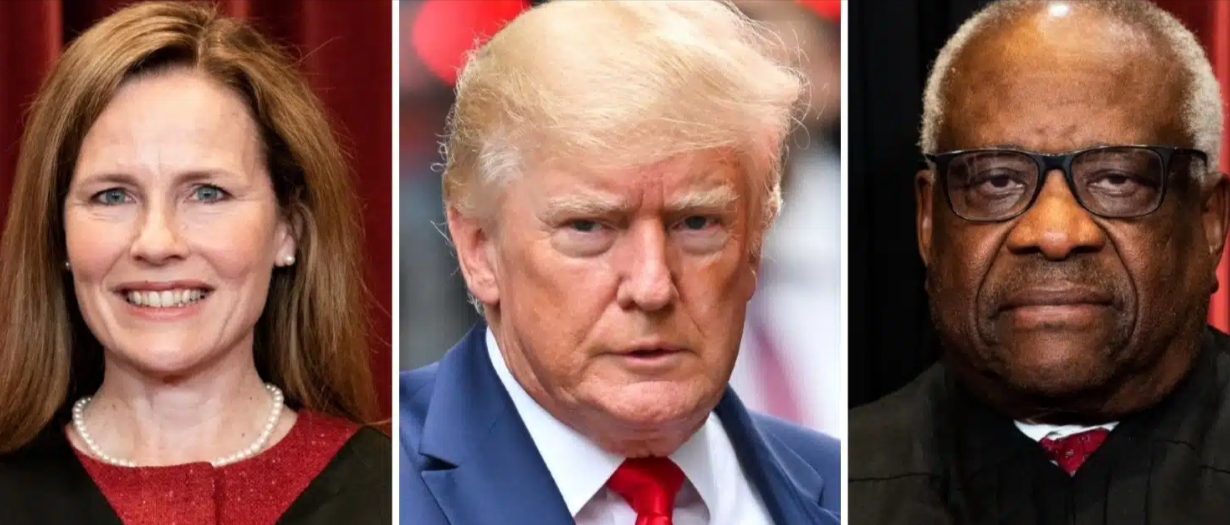Supreme Court Rejects Trump’s Request To Keep Billions In Foreign Aid Frozen

A sharply divided U.S. Supreme Court declined the Trump administration’s request to halt the distribution of billions of dollars in foreign aid that had already been approved by Congress.
In a 5-4 decision on Wednesday, the justices did not immediately specify when the funds must be released, effectively allowing the White House to continue contesting the issue in lower courts.
The ruling was unsigned, but four conservative justices—Samuel Alito, Clarence Thomas, Neil Gorsuch, and Brett Kavanaugh—dissented.
The majority, which consisted of Amy Coney Barrett, Elena Kagan, Sonia Sotomayor, Ketanji Brown Jackson, and Chief Justice John Roberts, determined that since the funds had already been allocated by the court's deadline last week, the lower courts should “clarify what obligations the government must fulfill to ensure compliance with the temporary restraining order.”
In a strongly worded dissent, Alito expressed his dismay, stating he was “stunned” by the court’s decision to allow the lower court to order the administration to unfreeze the foreign aid in question.
“A federal court has many tools to address a party’s supposed nonfeasance. Self-aggrandizement of its jurisdiction is not one of them,” Alito wrote.
Despite the narrow 5-4 split, Supreme Court analyst Steve Vladeck, a professor at Georgetown University Law Center, described the ruling as “extremely modest.”
“The unsigned order does not actually require the Trump administration to immediately make up to $2 billion in foreign aid payments; it merely clears the way for the district court to compel those payments, presumably if it is more specific about the contracts that have to be honored,” Vladeck explained. “The fact that four justices nevertheless dissented – vigorously – from such a decision is a sign that the Court is going to be divided, perhaps along these exact lines, in many of the more impactful Trump-related cases that are already on their way.”
The case reached the Supreme Court unusually quickly, moving through the federal judiciary in just a few days. It marks the second time the justices have reviewed a case involving Trump’s push to expand executive power and implement significant changes to government operations since he took office in January.
At the center of the case is the Trump administration’s decision to freeze billions of dollars in foreign aid from the State Department and the U.S. Agency for International Development (USAID) in January. The move was intended to curb spending and pressure agencies to align with the administration’s policy objectives.
Several nonprofit organizations that rely on these funds for global health and humanitarian programs filed a lawsuit, arguing that the administration’s actions circumvented Congress’s constitutional authority over government spending and violated federal rules on agency decision-making.
In a legal brief filed Friday, the groups described the administration’s actions as “devastating.”
They emphasized that the funding “supports US interests abroad and makes the lives of millions of people around the world better and, in many cases, saves their lives.”
The organizations further argued, “This helps stop problems like disease and instability across the ocean before they reach our shores.”
On February 13, U.S. District Judge Amir Ali ordered that much of the frozen aid should continue to be distributed while the case was under review. Days later, the plaintiffs claimed the administration was failing to comply and still blocking the release of funds. Ali responded by mandating that the money be spent by midnight on Wednesday.
Ali was appointed to the bench by President Joe Biden.
In a last-minute emergency appeal to the Supreme Court, the Trump administration sought a temporary pause in the case, arguing that it was making “substantial efforts” to review payment requests and distribute the funds but could not do so quickly enough to meet Ali’s deadline.
The groups suing the administration rejected this reasoning, asserting that certain political appointees were “refusing to authorize essentially any payments.”
“The government has not taken ‘any meaningful steps’ to come into compliance,” the plaintiffs stated in a Supreme Court filing.
Chief Justice Roberts, acting alone, granted the administration a brief reprieve on Wednesday by issuing an “administrative stay.” This procedural action temporarily paused the case to allow both sides to submit written arguments. Roberts, in his role overseeing emergency matters from the federal appeals court in Washington, D.C., handled the request.
Among the plaintiffs are the AIDS Vaccine Advocacy Coalition, a New York-based organization focused on accelerating HIV prevention efforts, and the Global Health Council, a Washington, D.C.-based group representing health program organizations.
In court filings, the Trump administration disclosed plans to terminate over 90% of USAID’s foreign aid grants. A government report revealed that “nearly 5,800 USAID awards were terminated and more than 500 USAID awards were retained.”
“The total ceiling value of the retained awards is about $57 billion,” the filing stated.
Additionally, the government informed a lower court that “approximately 4,100 State awards were terminated and approximately 2,700 State awards were retained,” indicating that a significant portion of State Department aid programs had been discontinued.
As a result of the aid freeze, numerous global assistance programs have come to a standstill, disrupting critical services. This development coincides with a period in which the Trump administration has dismissed or placed most USAID staff on administrative leave.